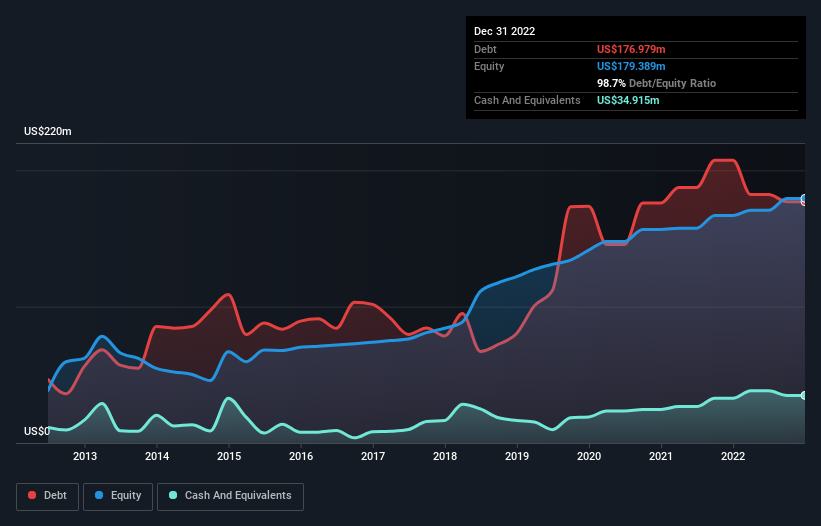
Legendary fund manager Li Lu (who Charlie Munger backed) once said, 'The biggest investment risk is not the volatility of prices, but whether you will suffer a permanent loss of capital.' It's only natural to consider a company's balance sheet when you examine how risky it is, since debt is often involved when a business collapses. As with many other companies JB Foods Limited (SGX:BEW) makes use of debt. But is this debt a concern to shareholders?
What Risk Does Debt Bring?
Generally speaking, debt only becomes a real problem when a company can't easily pay it off, either by raising capital or with its own cash flow. Ultimately, if the company can't fulfill its legal obligations to repay debt, shareholders could walk away with nothing. While that is not too common, we often do see indebted companies permanently diluting shareholders because lenders force them to raise capital at a distressed price. Of course, plenty of companies use debt to fund growth, without any negative consequences. The first thing to do when considering how much debt a business uses is to look at its cash and debt together.
View our latest analysis for JB Foods
What Is JB Foods's Debt?
You can click the graphic below for the historical numbers, but it shows that JB Foods had US$177.0m of debt in December 2022, down from US$207.4m, one year before. However, because it has a cash reserve of US$34.9m, its net debt is less, at about US$142.1m.

How Strong Is JB Foods' Balance Sheet?
We can see from the most recent balance sheet that JB Foods had liabilities of US$258.3m falling due within a year, and liabilities of US$33.6m due beyond that. On the other hand, it had cash of US$34.9m and US$66.4m worth of receivables due within a year. So it has liabilities totalling US$190.5m more than its cash and near-term receivables, combined.
This deficit casts a shadow over the US$105.6m company, like a colossus towering over mere mortals. So we'd watch its balance sheet closely, without a doubt. At the end of the day, JB Foods would probably need a major re-capitalization if its creditors were to demand repayment.
We measure a company's debt load relative to its earnings power by looking at its net debt divided by its earnings before interest, tax, depreciation, and amortization (EBITDA) and by calculating how easily its earnings before interest and tax (EBIT) cover its interest expense (interest cover). This way, we consider both the absolute quantum of the debt, as well as the interest rates paid on it.
JB Foods's debt is 4.3 times its EBITDA, and its EBIT cover its interest expense 4.1 times over. This suggests that while the debt levels are significant, we'd stop short of calling them problematic. The silver lining is that JB Foods grew its EBIT by 174% last year, which nourishing like the idealism of youth. If it can keep walking that path it will be in a position to shed its debt with relative ease. There's no doubt that we learn most about debt from the balance sheet. But you can't view debt in total isolation; since JB Foods will need earnings to service that debt. So if you're keen to discover more about its earnings, it might be worth checking out this graph of its long term earnings trend.
But our final consideration is also important, because a company cannot pay debt with paper profits; it needs cold hard cash. So it's worth checking how much of that EBIT is backed by free cash flow. Looking at the most recent three years, JB Foods recorded free cash flow of 20% of its EBIT, which is weaker than we'd expect. That's not great, when it comes to paying down debt.
Our View
We'd go so far as to say JB Foods's level of total liabilities was disappointing. But at least it's pretty decent at growing its EBIT; that's encouraging. Overall, we think it's fair to say that JB Foods has enough debt that there are some real risks around the balance sheet. If everything goes well that may pay off but the downside of this debt is a greater risk of permanent losses. There's no doubt that we learn most about debt from the balance sheet. But ultimately, every company can contain risks that exist outside of the balance sheet. For instance, we've identified 4 warning signs for JB Foods (2 are a bit concerning) you should be aware of.
Of course, if you're the type of investor who prefers buying stocks without the burden of debt, then don't hesitate to discover our exclusive list of net cash growth stocks, today.
New: Manage All Your Stock Portfolios in One Place
We've created the ultimate portfolio companion for stock investors, and it's free.
• Connect an unlimited number of Portfolios and see your total in one currency
• Be alerted to new Warning Signs or Risks via email or mobile
• Track the Fair Value of your stocks
Have feedback on this article? Concerned about the content? Get in touch with us directly. Alternatively, email editorial-team (at) simplywallst.com.
This article by Simply Wall St is general in nature. We provide commentary based on historical data and analyst forecasts only using an unbiased methodology and our articles are not intended to be financial advice. It does not constitute a recommendation to buy or sell any stock, and does not take account of your objectives, or your financial situation. We aim to bring you long-term focused analysis driven by fundamental data. Note that our analysis may not factor in the latest price-sensitive company announcements or qualitative material. Simply Wall St has no position in any stocks mentioned.
About SGX:BEW
JB Foods
An investment holding company, engages in the production and sale of cocoa ingredient products primarily in Singapore, Malaysia, Indonesia, the People’s Republic of China, and the United States.
Good value with slight risk.
Similar Companies
Market Insights
Community Narratives





